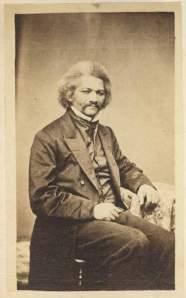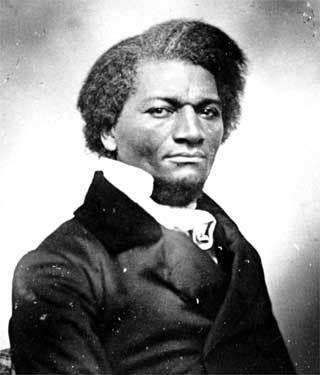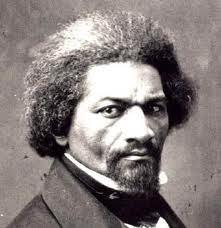
Courtesy of the National Park Service, Frederick Douglass National Historic Site, Frederick Douglass
Today, Frederick Douglass seems a formidable and imposing figure, his speech eloquent, inspiring, provocative and fiery. He was certainly all of this and more. But he also made people laugh. During the antebellum years, lecturing alongside an uncompromising firebrand like Henry Highland Garnet could mean broken bones (and Douglass himself could attest to this), lecturing with Douglass usually meant getting out unscathed, outwitting the enemy, and perhaps even changing some minds — even if his humor bothered some critics.
But as Billy Kersands, a renowned African American blackface performer, once said without a trace of a smile, “Son, if they hate me, I’m still whipping them, because I’m making them laugh.” While Douglass wrote caustically about white blackface performers and earlier African American blackface performers such as Gavitt’s Serenaders, I think that he shared Kersands’ assessment of the power of humor.
Douglass’s humor ranged from the self deprecating to the bitingly caustic. He wielded humor to defuse tense situations, but, perhaps more importantly, he used it as an activist strategy to forward the abolitionist cause and as a powerful tool in the fight for equal rights. Often these moments of humor were simply that — moments inserted to defuse tension or to skewer a point with precision. Other times, Douglass used extended routines to drive home his points and pull his audience right along with him.
One of his most powerful extended uses of humor is when he takes on the persona of a white preacher addressing a slave congregation (the actual audience being made up of largely white attendees and hecklers at abolitionist meetings). This text is from a meeting in Scotland in 1846, but he used versions of this speech for years across America, too. The speech presented below is excerpted from a newspaper account, and it includes parenthetical asides relating the audience’s responses. The reporter sets up the speech, saying that Douglass was going to
give them a sketch of a sermon which he had often heard preached. The text was ‘Servants obey your masters.” He would divide it into separate heads, and here he was going to imitate the preacher, for he wanted to show them how rantingly, how piously he might appear when in the service of the wicked one himself. Mr. Douglass then in tones of mimic solemnity gave the following epitome of the discourse:

—”Servants obey your masters.”
–You should obey your masters, in the first place, because your happiness depends on your obedience. (Cheers and laughter.) Now, servants, such is the relation constituted by the Almighty between cause and effect, that there can be no happiness neither in this world nor the world to come save by obedience; and it is a fact, that whenever you see misery, wretchedness, and poverty, want and distress, all is the result of disobedience. (Laughter.) Peculiarly is this the case with yourselves. Under the providence of God, you sustain a very peculiar relation to your masters. The term “servant” in the text means slave, and you will of consequence perceive that this is a message to you by the mouth of the Apostle; so as a preacher of the Gospel I beg you to listen to the words of wisdom. (Great laughter.)
–I said it was peculiarly the case that your happiness depends upon your obedience. It is verily true, and suffer me to illustrate this position by the statement of a fact. A neighbour of mine sent his servant Sam into the fields to perform a certain amount of labour which ought to have taken him two hours and a half. Now, by the way, his master was a pious soul, and after having waited till the expiration of the time which he had allotted to Sam for the performance of the work, he went out into the field, as he was accustomed to do, for the purpose of ascertaining why Sam was detained. (Laughter.) When he went, lo and behold, there lay Sam, his hoe in one place, and Sam fast asleep in the corner of the fence. (Great laughter and cheers.) Think of the feelings of that pious master. Oh! it was a trying situation for a servant of the Lord to be placed in. (Laughter.) He went “to the law and to the testimony” to know his duty, and he there found it written, that “the servant who knoweth his master’s will, and doeth it not, shall be beaten with many stripes.” Accordingly, he took up Sam, and lashed him till he was not able to bear it. Now this is the point I want to come to. To what was Sam’s whipping traceable? (Cheers and laughter.) Solely to disobedience. (Much laughter.) If you would be happy, therefore, and not be whipped, you will avoid sleeping when you should be working, for if you would enjoy and live under the sunshine of your master’s good pleasure, let me implore you, as one who loves your souls, ”be obedient to your masters.” (Cheers and laughter.)
–You should obey your masters, in the second place, because of a sense of gratitude for your present situation compared with what it might have been. You should be inspired by a knowledge of the fact, that the Lord, in his mercy, brought you from Africa to this Christian country. (Shouts of laughter.) Oh! this is an important consideration, and one to which I will call your attention for a few moments. Your fathers—and I dread to enter upon the picture—were taken from Africa—degraded, lost, and ruined Africa—darkness may be said to cover that earth, and gross darkness that people—to be brought into the sunshine of this land of freedom. (Laughter.) Your fathers were living destitute of the knowledge of the gospel—destitute of all those civilising influences which you find surrounding you in this new region—destitute of religion, and bowing down to stocks and stones, and worshipping images. While they were in this state of deep despair the Lord put it into the minds of good men to leave their homes, to leave their families, and to brave the perils of the ocean, that they might snatch you as brands from the burning, and bring you to this Christian country. (Great applause and laughter.)

–I will now go to another head of my text. Thirdly—(a laugh)—You should obey your masters, in the third place, because of your being adapted to your present condition. Now, servants, it is one of the peculiar marks of the wisdom of the Almighty, that whenever he establishes a relation amongst mankind he accompanies it with evidence of its fitness, and of the adaptability of parties to their several conditions. The relation of husband and wife, parent and child, the relation of ruled and rulers, of sovereign and subjects, and so on, all show this mark of adaptation. So the relation of master and slave!
–Permit me to point out to you some of the peculiarities and characteristics which show most conclusively that you should be contented to fill the very situation which you now find yourselves placed in. For instance, you have hard hands, strong forms, robust constitutions, black skins, and curly hair. (Cheering and laughter.) On the other side, we have soft hands, tender forms, delicate constitutions, and white skins. (Renewed cheers and laughter.) Oh! I wish to ask you from whence come these differences? “It is the Lord’s doing, and marvellous in our eyes.” (Shouts of laughter and applause.) Now your hard hands and robust constitutions amply fit you to labour under our burning sun in the position in which you find yourself placed; while your masters and mistresses cannot labour thus. (Applause.) The Lord has blessed you with black skins and strong constitutions; but, ah! boast not of your strength—boast not of those advantages, for while he has given you these advantages, he has also given us powers which mutually benefit you. (Loud applause.) You have not so much intellect as we have, so that you cannot take care of yourselves, nor provide for yourselves, and you would be in a most wretched condition if ever the Lord were to leave you to be guided by your own intellects. Thank God that we take care of you. Oh! the wisdom of God who made one class to do the thinking, while another class does the working! (Cheers.)
He hoped they would now allow him to say Amen.
*****************
Excerpted from Frederick Douglass, “The Free Church of Scotland and American Slavery: An Address Delivered in Dundee, Scotland, on January 30, 1846.” Dundee Courier, February 3, 1846. Blassingame, John (et al, eds.). The Frederick Douglass Papers: Series One–Speeches, Debates, and Interviews. New Haven: Yale University Press, 1979. Vol. I, p. 144. Paragraphs 11-15.
Reprinted with permission from the Gilder Lehrman Center for the Study of Slavery, Resistance, and Abolition. Yale University.
